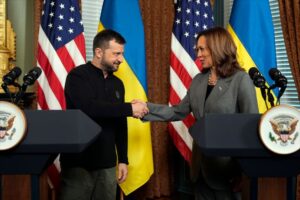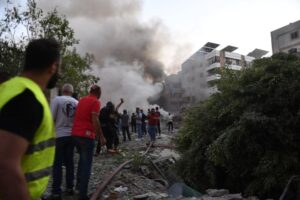Netanyahu Vows That Israel Will Keep ‘Degrading Hezbollah’ In UN Speech
The United Nations says over 90,000 people have been displaced by five days of Israeli strikes on Lebanon.
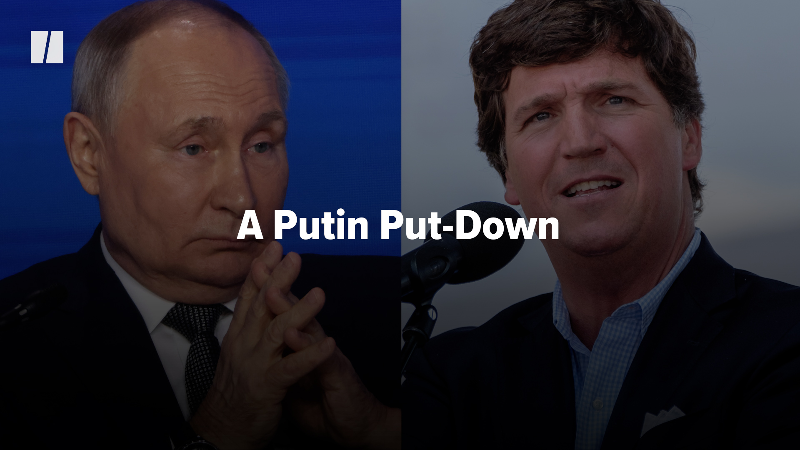
UNITED NATIONS (AP) — His leadership strained by conflicts on two fronts, Israeli Prime Minister Benjamin Netanyahu told world leaders at the United Nations on Friday that his nation will “continue degrading Hezbollah” until achieving its goals along the Lebanon border, further dimming hopes for an internationally backed cease-fire to halt the spiral into an all-out regional war. He said his government would no longer tolerate daily rocket fire from the area.
Shortly after Netanyahu wrapped up his speech, the Israeli military said it carried out a strike on Hezbollah’s headquarters in Beirut, which caused huge blasts in the city. A couple hours after that, he announced he was cutting his trip short and departing for Israel on Friday night.
“Israel has every right to remove this threat and return our citizens to their home safely. And that’s exactly what we’re doing … we’ll continue degrading Hezbollah until all our objectives are met,” Netanyahu said to a gallery that — at least from the crowd noise — appeared replete with his supporters.
“Just imagine if terrorists turned El Paso and San Diego into ghost towns … How long would the American government tolerate that?” he said, shaking his fist in emphasis. “Yet Israel has been tolerating this intolerable situation for almost a year. Well, I’ve come here today to say: Enough is enough.”
Netanyahu, armed with visual aids as he has been in the past, defended his nation’s response to the Oct. 7, 2023, attacks by Hamas on Israel that triggered an Israeli military operation that has devastated the Gaza Strip. He said he traveled to the United Nations to refute the untruths he had heard from other leaders on the same rostrum earlier in the week.
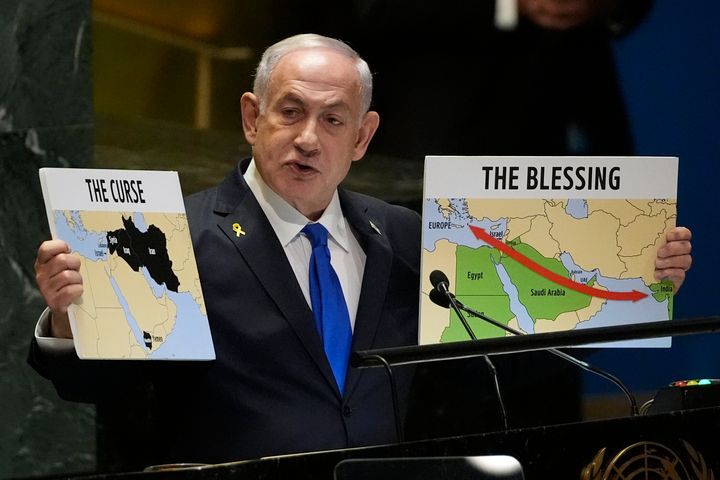
“I didn’t intend to come here this year. My country is at war fighting for its life,” Netanyahu said. “But after I heard the lies and slanders leveled at my country by many of the speakers at this podium, I decided to come here and set the record straight.”
He insisted that Israel wanted peace but said of Iran: “If you strike us, we will strike you.” He once again blamed Iran for being behind many of the problems in the region.
“For too long, the world has appeased Iran,” Netanyahu said. “That appeasement must end.”
When Netanyahu entered the hall and was introduced, boos and raised voices echoed, and many delegates walked out through various exits. As he spoke, the seats in the Iran delegation sat empty. Outside, protesters against Netanyahu and Israel’s policies demonstrated behind police barricades.
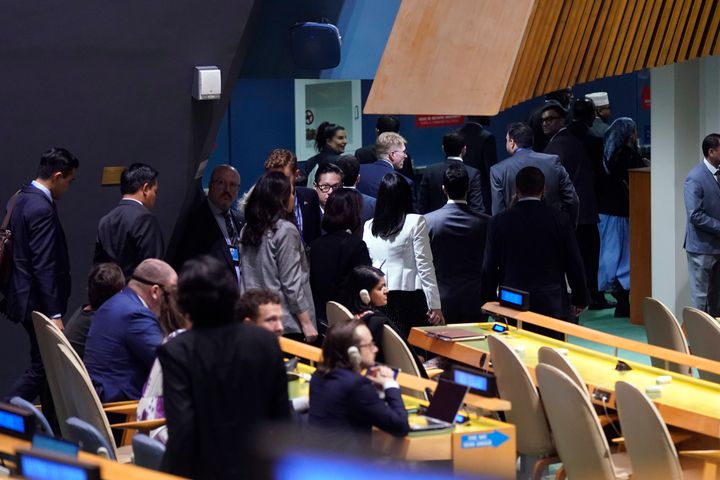
Israel is fighting on two fronts
Israel’s campaign in Gaza has killed more than 41,500 Palestinians and wounded more than 96,000 others, according to the latest figures released Thursday by the Health Ministry. The ministry, part of Gaza’s Hamas government, doesn’t differentiate between civilians and combatants, but more than half the dead have been women and children, including about 1,300 children under the age of 2.
Israel has maintained its military operations are justified and are necessary to defend itself.
“This war can come to an end now. All that has to happen is for Hamas to surrender, lay down its arms and release all the hostages,” Netanyahu said. “But if they don’t – if they don’t – we will fight until we achieve total victory. Total victory. There is no substitute for it. “
He said Israeli forces have destroyed “90%” of Hamas’ rockets and killed or captured half of its forces. But he insisted nonetheless that he was pursuing peace. “Israel has made peace and will make peace again,” he said.
In recent days, Israel has turned its attention to the border with Lebanon, where it is has stepped up strikes targeting Hezbollah but has inflicted civilian casualties as well. Hezbollah began firing rockets into Israel almost immediately after the Hamas attack, saying it was a show of support for the Palestinians. That triggered Israeli counterfire and the two sides have traded fire almost daily for the 11 months since, driving tens of thousands of people from their homes on both sides of the border.
Israel vows to drive Hezbollah away from the border to allow its citizens to return safely to their homes. Hezbollah says it won’t stop firing rockets until the Gaza war ends. Late Wednesday, the United States, France and other allies jointly called for an “immediate” 21-day cease-fire to allow for negotiations as fears grow that this week’s escalation could spiral into an all-out war. Hezbollah hasn’t officially responded to the ceasefire proposal.
The United Nations says over 90,000 people have been displaced by five days of Israeli strikes on Lebanon, bringing the total to 200,000 people who have been displaced in Lebanon since the cross-border exchanges began.
His speech impacted the rest of the General Assembly
Netanyahu also made a lengthy appeal for Israeli relations with Saudi Arabia — but did it without mentioning what’s blocking any action: Saudi Arabia’s demand for an independent Palestinian state.
As Netanyahu took the stage Friday morning, there was enough ruckus in the audience that the presiding diplomat had to shout, “Order, please.”
The two speakers who preceded Netanyahu on Friday each made a point of calling out Israel for its actions. “Mr. Netanyahu, stop this war now,” Slovenian Prime Minister Robert Golob said as he closed his remarks, pounding the podium. And Pakistani Prime Minister Shehbaz Sharif, speaking just before the Israeli leader, declared of Gaza: “This is not just a conflict. This is systematic slaughter of innocent people of Palestine.” He thumped the rostrum to audible applause.
Support Free Journalism
Already contributed? Log in to hide these messages.
And after the Israeli leader left the stage, the next speaker, Prime Minister Mia Mottley of Barbados, started speaking but then paused for noises in the gallery, saying, “We can wait.” She did so for about 20 seconds before she continued.
It wasn’t just Friday, either. On Thursday, the leader of the Palestinian Authority and a top Lebanese official both made their cases to fellow leaders — cases that included harsh words for Israel as well. Mahmoud Abbas’ first words to the General Assembly were a sentence repeated three times in reference to Gaza: “We will not leave. We will not leave. We will not leave.” He accused Israel of destroying Gaza and making it unlivable. And Abdallah Bouhabib, Lebanon’s foreign minister, decried Israel’s “systematic destruction of Lebanese border villages.”
“The crisis in Lebanon threatens the entire Middle East,” Bouhabib said. “We wish today to reiterate our call for a cease-fire on all fronts.”
Support Free Journalism
Already contributed? Log in to hide these messages.

